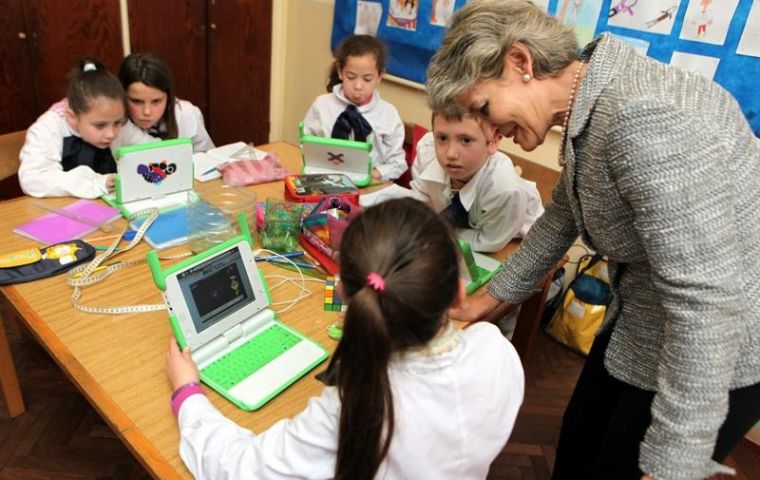MercoPress. South Atlantic News Agency
“One child-one laptop” program in Uruguay has failed to improve results in maths and reading
 Uruguayan children with their green-coloured Ceibal laptops
Uruguayan children with their green-coloured Ceibal laptops The Uruguayan pioneering program “one child-one laptop” did not improve their performance in basic subjects such as maths and reading, according to a report from the country’s Institute of Economy and financed by the same education authorities. The report also points out to the lack of content in the laptops and the poor training of teachers.
The report “Looking into the effects of the Plan Ceibal (as the program is identified)” was done with experts from different fields contributing and points out that after several years of their implementation “there is no improvement in the academic results of the students”.
The emphasis was in the impact of the laptops in reading and maths by following a group of students several years, including their study habits and individual perception of their knowledge abilities, points out the report released in August.
Four different surveys and assessments were included in the report: one dating back to 2006 as a base line providing data before the implementation of the Plan Ceibal, two from 2009 and one from 2012.
Thus among the main conclusions of the report is that “the results suggest that the Plan Ceibal seems to have had no impact for Maths and Reading, be it at general level or at different socio-economic level”.
The report also points out that the results are in line “with most of the literature on the impact of the use of computers for learning, which found null or negative results”.
One of the researchers and contributors to the report, economist Alina Machado said that the first approach was to assess the impact of the plan in general and it was when “we found no effects on Maths or Reading”. The following step was to assess the home background of the children.
“We started by checking on the mother’s education level and if they had a computer in their home before 2006, when the plan was launched and neither way did we arrive to the conclusion that the plan had a positive effect”.
Economist Machado added that “we did not perceive an impact in self-perception abilities in the analyzed subjects or in other abilities related to the use of Internet” and on assessing the descriptive data of the frequency of the use of the laptops in class “we realized that there was no massive use of them in all schools and in the different education programs”.
As to why no academic improvements were perceived the economist and researcher said that the report indicates that the main use of the computers in class is to look for information in internet, which means “there is no indication or incentive to expect a positive effect on Maths and Reading abilities”.
Machado added that on analyzing the frequency and kind of use of the laptops it was found that in Secondary school the use was “very low and limited” while in Primary school, even when less lower it was used basically to search in internet or navigate in the web but not with the purpose of links that could help with learning”.
The Plan Ceibal was started in 2006 with President Tabare Vazquez promising one laptop for each student and each teacher in government schools, and paid by government. By 2009 the plan had reached all of Montevideo and it was extended to Secondary education and trades-training schools.
The initiative “one child-one laptop” has been praised internationally but the main criticism has been that it has not been supported by pedagogic input or trained teachers for this kind of education.
“To ensure that the ‘tool’ effectively helps learning, it needs the development of strategies which point to empowering teachers and the creation of collective capacities which help to concentrate in teaching and learning through access and use of innovative technology”.
“We noticed a clear lack of integration of the tool with the class and the fact teachers don’t take advantage of computers as an innovation tool for teaching and rendering improved academic results”, said Ms Machado. And if teachers are not convinced of incorporating the laptops as learning tools, “it will be very difficult to improve learning results”.
Finally Ms Machdo said that the education authorities and those responsible for the implementation of the Plan Ceibal received the report in ‘good spirit and interest’ since the results did not surprise them “because they were aware that there still is a long way to cover” and improving Maths and reading remain crucial areas.
However the Plan Ceibal generates “great opportunities for the future and the point is that there are still enormous challenges ahead”, while the most difficult part seems to be convincing teachers to get hold of the technology and of the tool”, concluded Ms Machado.
Miguel Brechner, president of the Plan Ceibal board said the report on results of the experience in Uruguay reveals the big debate going on in the world and that is how to integrate technology with pedagogy.
“Technology in the last fifty years has changed the life of every citizen in the world and even more in the last ten years, but implementing technology change to education systems is very low”, said Brechner,
“The great challenge is how to integrate technology with pedagogy” he insisted recalling that Uruguay is the country in the world with the largest technology infrastructure in this field”.





Top Comments
Disclaimer & comment rules-

-

-

Read all commentsLaptop or not,
Sep 19th, 2013 - 09:09 am 0Their government has a great sense of humor..lol
.
“one child-one laptop” did not improve their performance in basic subjects such as maths and reading”
Sep 19th, 2013 - 09:20 am 0But they are really good at Angry Birds....
@2 LOL I was thinking the same thing.
Sep 19th, 2013 - 10:42 am 0Well-educated and well-trained teachers are more important than any gadget. Being computer literate is something quite different.
Commenting for this story is now closed.
If you have a Facebook account, become a fan and comment on our Facebook Page!